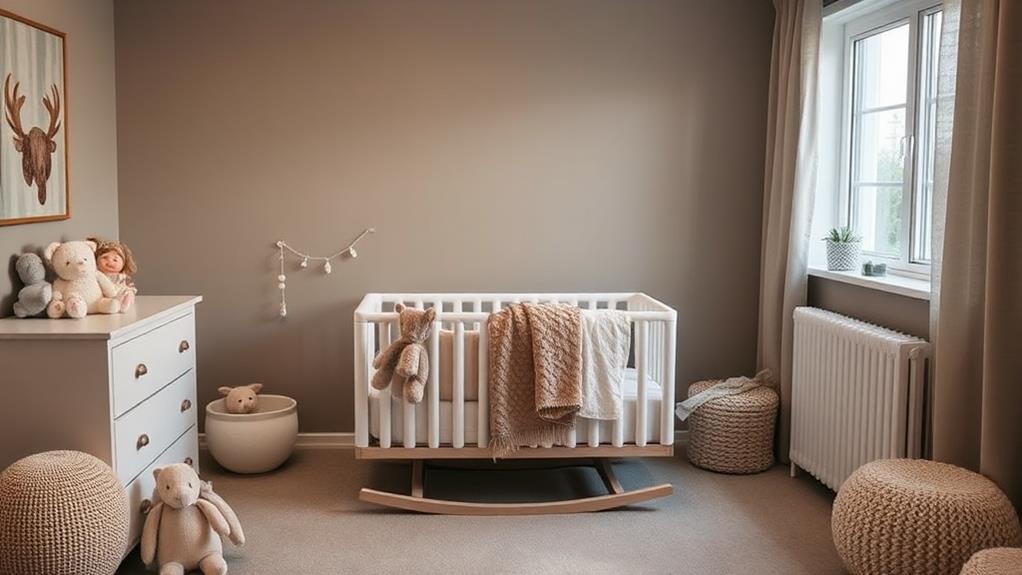When you notice your baby rubbing their eyes or becoming unusually fussy, it could signal that they're overtired. Understanding these signs is essential for improving their sleep quality. You might think you've got a handle on their sleep patterns, but subtle cues can often be overlooked. Establishing a consistent routine and a calming environment can make a significant difference, yet many parents find themselves unsure of the next steps. What strategies can you implement to ensure your baby gets the rest they need? Let's explore some effective methods that could transform their sleep experience.
Understanding Overtiredness

When it comes to your baby's sleep, understanding overtiredness is crucial for fostering better rest. Overtiredness occurs when your little one stays awake for too long, leading to a state of heightened stress and frustration.
It's important to recognize that babies have different sleep needs compared to adults, and they can quickly become overstimulated. When this happens, their ability to fall asleep diminishes, making bedtime more challenging.
To prevent overtiredness, you should establish a consistent sleep routine that helps your baby wind down. This routine can include calming activities like reading a book or singing a lullaby.
Keep an eye on the clock, as every baby has a unique window of wakefulness. If you notice your baby's mood shifting or their energy levels dropping, it might be time to start the bedtime process.
Additionally, a cozy sleep environment can make a significant difference. Dim the lights, reduce noise, and ensure the room temperature is comfortable.
Common Signs of Fatigue
Recognizing the common signs of fatigue in your baby is essential for ensuring they get the sleep they need. Babies can't always tell you when they're tired, so it's up to you to watch for those telltale signs. One of the first signs is rubbing their eyes or pulling at their ears. You might also notice them becoming fussy or irritable, which can escalate quickly if not addressed.
Another indicator is a sudden loss of interest in their surroundings. If your baby stops playing or looks away from their toys, it could mean they're ready for a nap. Additionally, yawning can be a clear signal; it's nature's way of saying they need rest.
You might also observe that your little one starts to zone out or appears to be in a daze. This often happens when they're overstimulated and can't process everything around them.
Lastly, if your baby starts to cling to you or seek comfort, it's a strong sign they're ready for some quiet time. By recognizing these signs early, you can help your baby get the restful sleep they need to thrive.
Impact of Overtiredness on Sleep

Overtiredness can significantly disrupt your baby's sleep patterns, leading to a cycle that's hard to break. When your little one is overtired, they may struggle to fall asleep, resulting in longer bedtime battles and more frequent awakenings during the night. This can create a frustrating situation for both of you, as lack of sleep affects your baby's mood, making them fussier and more irritable.
You might notice that when your baby is overly tired, they become hyperactive or restless, which seems counterintuitive. This behavior is your baby's way of coping with exhaustion. Instead of settling down, they might kick and squirm, making it even tougher for you to get them to sleep.
Additionally, overtired babies often experience shorter sleep cycles, causing them to wake up earlier than usual, leaving you both feeling drained. In this state, your baby's body releases stress hormones, which can further complicate their ability to relax and fall asleep.
Importance of a Sleep Routine
Establishing a consistent sleep routine is essential for helping your baby develop healthy sleep habits. When you create a predictable schedule, your little one learns when it's time to wind down. This predictability helps regulate their internal clock, making it easier for them to fall asleep and stay asleep.
A sleep routine can include calming activities like bathing, reading a story, or singing a lullaby. These rituals signal to your baby that it's time to relax and prepare for sleep. Not only does this routine promote better sleep, but it also helps strengthen the bond between you and your baby, as you share these calming moments together.
Moreover, a consistent routine can minimize fussiness and crying at bedtime. When your baby knows what to expect, they're less likely to feel anxious or overtired. You'll find that a well-established routine can lead to more peaceful nights for both of you.
Lastly, remember that every baby is unique. What works for one may not work for another. Be patient and flexible as you find the right rhythm for your baby's sleep routine, and enjoy the benefits of improved sleep for your entire family!
Creating a Calm Sleep Environment

Creating a calm sleep environment is crucial for your baby's ability to drift off peacefully. Start by choosing a quiet room, away from loud noises and distractions. Soft, gentle sounds, like a white noise machine or soothing lullabies, can help drown out any sudden noises that might disturb your baby's sleep.
Next, dim the lights to create a cozy atmosphere. Soft, warm lighting signals to your baby that it's time to wind down. You might also want to consider blackout curtains to keep the room dark, especially during nap times or early evenings.
Temperature plays a role too; keep the room comfortably cool, ideally between 68 and 72 degrees Fahrenheit. A slightly cooler environment helps your baby sleep better.
Lastly, maintain a clutter-free space. A tidy room can contribute to a sense of calm, making it easier for your baby to relax. You can add a few soft toys or a special blanket to create a sense of security.
Strategies to Promote Better Sleep
Many parents find that implementing specific strategies can significantly enhance their baby's sleep quality. One effective approach is establishing a consistent bedtime routine. This could include a warm bath, gentle rocking, or reading a short story. These calming activities signal to your baby that it's time to wind down.
Next, be mindful of nap times. Keeping your baby's sleep schedule balanced can prevent overtiredness, which often leads to difficulty falling asleep at night.
Additionally, you can create a conducive sleep environment by dimming the lights and using white noise machines to block out disruptive sounds.
You should also pay attention to your baby's feeding schedule. A well-fed baby is more likely to sleep soundly through the night.
If your baby tends to wake up frequently, consider adjusting their feeding times to see if that helps.
Recognizing Individual Sleep Needs

Understanding that every baby has unique sleep needs is crucial for promoting better rest. Just like adults, each baby has their own rhythm and patterns when it comes to sleep.
Some may thrive on longer naps, while others might need shorter, more frequent bursts of sleep. Pay attention to your baby's cues, as they can signal their specific needs.
For instance, if your little one seems fussy or overly active, it might be a sign they need more sleep. Conversely, if they're hard to wake during the day, they might be getting too much rest.
You should also consider their age and developmental stage, as these factors dramatically influence sleep requirements.
Newborns typically need around 16 to 18 hours a day, while toddlers may require about 12 to 14 hours, including naps.
When to Seek Professional Help
Your baby's sleep patterns can sometimes raise concerns, and knowing when to seek professional help is essential. If you notice that your little one consistently struggles to fall asleep or stay asleep, it might be time to consult a pediatrician or a sleep specialist.
Frequent night awakenings, excessive fussiness during the day, or difficulty settling down for naps can indicate underlying issues.
Additionally, if your baby is older than six months and still waking multiple times a night or if you feel overwhelmed by their sleep challenges, don't hesitate to reach out for support.
It's also important to pay attention to any unusual behaviors, such as excessive crying, changes in appetite, or developmental delays. These signs can help guide your decision.
Tips for Daytime Naps

Establishing a consistent nap routine can significantly enhance your baby's daytime sleep quality. Start by creating a calming environment during nap times. Dim the lights, close the curtains, and minimize noise to help your little one relax. You might even consider using a white noise machine to drown out any distracting sounds.
Next, pay attention to your baby's sleep cues. Signs like rubbing eyes, yawning, or fussiness indicate that it's time for a nap. Aim for a regular schedule, as babies thrive on predictability. Try to put your baby down for a nap around the same times each day to help their body clock adjust.
You can also create a soothing pre-nap ritual. Activities like reading a short story or singing a lullaby can signal that it's time to wind down.
If your baby resists napping, don't stress. Sometimes, a short cuddle or gentle rocking can help them settle.
Lastly, keep in mind that every baby is different. Some may need more frequent naps, while others may require longer stretches of awake time. Stay flexible and responsive to your baby's needs, and you'll soon find a rhythm that works for both of you.




